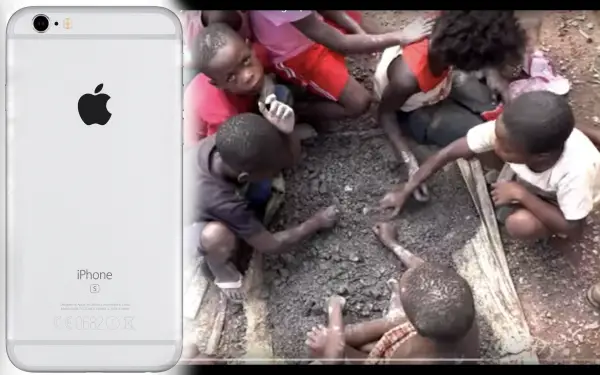Children “As Young As Four” Are Mining The Mineral Used In Our Smartphones
Tags: opinion

by Luke Miller,
From 1998 to 2008 an estimated 5.4 million people have died due to the conflict in the country currently known as the Democratic Republic Congo. To put this into perspective it was estimated that 6 million people died, in the Holocaust. While the war and displacement have been fluctuating since this time, the country is still being plagued by violence from rebel groups who continue to operate there. The displacement of hundreds of thousands of people a year have continued to occur over the last decade. But renewed fighting and conflict from 2016 to 2017 caused the displacement of an estimated 2.2 million people, at the end of which 4.5 million people were living in a situation of displacement.
At first glance, this may not seem like a problem that the everyday westerner is contributing to, but when you dig a little deeper there is a different story to be told.
Coltan is the conflict mineral that is in nearly every cell phone, laptop, and electronic device, and the Democratic Republic of Congo (DRC) is the world’s leading supplier of this mineral. DRC is very mineral rich also supplying the world with copper, diamond, tantalum, tin, and gold. In 2009 (DRC) had an estimated $24 trillion in unmined mineral deposits, which included the world’s largest reserves of coltan.
Rebel wars and conflict have been a constant in DRC for the past 20 years, but in late 2000, a huge demand for coltan spiked when the PlayStation 2 caused a dramatic rise in its price. With this spike came intensified violence in Eastern Congo, as according to a U.N. report the rising price “brought in as much as $20 million a month to rebel groups”. Then in the mid-2000s with the smartphone boom, demand for this mineral has progressively intensified year after year.
A 2016 Sky investigation found that mines in DRC employ children “as young as four” to work in the coltan mines, in desperately dangerous conditions. The children earn wages as low as 8p (10 cents) a day, are made to dig the mines barehanded and are often subjected to violence and intimidation.
Reports show that corporations such as Apple, Sony, and Samsung are using coltan from these mines, which have “little to no labor regulations”. In 2016, Amnesty International released a report showing that many of these companies fail to do basic checks which could help prevent this child labor.
In 2017 Washington Post reported Apple would temporarily stop buying coltan which is hand mined in Congo, with a spokesperson saying “We have been working with (mining company) Huayou on a program that will verify individual artisanal mines, according to our standards,” and continued “these mines will re-enter our supply chain when we are confident that the appropriate protections are in place.”
With this in mind, the war continues to intensify with many leading electronic suppliers refusing to stop supporting the conflict.

Leave Comment: